(**) Disclosure: This post may contain affiliate links, meaning RealEstateCareerHQ.com will get a commission if you decide to make a purchase through the links, but at no additional cost to you.
To become a notary loan signing agent in Idaho, an applicant must:
- Meet the state eligibility requirement;
- Obtain a $10,000 surety bond;
- Submit a notarized application to the Idaho Secretary of State;
- Pay the $30 filing fee;
- Purchase the notary seal and journal
Although you could work on different types of documents, the loan signing business in the real estate market seems to be a lucrative niche.
So what does a loan signing agent do? When people are getting a mortgage to purchase a house, or they need to refinance their property, there will be loan documents involved. Your role as a notary loan signing agent is to walk through the set of loan documents with the borrower and witness them in signing the paperwork.
You would also need to verify the identity of the signers, place the notary stamp on the signed documents, then send them back to the signing services company or closing attorney.
But keep in mind that you should NOT be providing legal advice, and you cannot explain the terms of the loan documents to the borrower.
In this guide, you’ll find out the steps to become a notary in Idaho, income updates, and FAQ about this profession.
But before we start, I want to give a brief disclaimer. This post is not intended as legal advice or state/federal notary public training. It is for general information only. Please check with your state to be sure that loan signing agents are utilized in the closing process. Always follow your state’s notary laws and best practices.
Would you like to learn how to make $75 to $200 per signing appointment? You must check out the Loan Signing System from Mark Wills. (**) This is one of the best training programs for loan signing agents. Many students have achieved remarkable business success after taking this program.
7 Steps to Become a Notary Loan Signing Agent in Idaho

Step 1: Meet the eligibility requirement
- At least age 18 of age
- Citizen or permanent legal resident of the U.S
- Resident or have a place of employment/practice in Idaho
- Able to read and write
- Not disqualified under the Idaho Code §51-123
Step 2: Purchase a surety bond
The Secretary of State requires you to purchase a $10,000 surety bond with a 6 years term. You may get it from a licensed surety such as a notary bonding company, an insurance company, or a notary organization. You could search for them online.
Note that the surety bond is to protect those for whom the notary public performs a notarization, but not you as a notary public. If you need coverage for your practice, you should consider getting an Error & Omission insurance (E&O).
I just checked with a surety bond issuer. Below is their premium structure.
| Coverage | Premium |
|---|---|
| $10,000 bond | $50 |
| $10,000 bond with $5,000 E&O coverage | $60 |
| $10,000 bond with $10,000 E&O coverage | $100 |
| $10,000 bond with $20,000 E&O coverage | $130 |
Source: Suretybonds.com (Aug 27, 2020)
Step 3: Submit the application to the Secretary of State
The Idaho Secretary of State is responsible for appointing and commissioning notaries. You need to fill out the application through their website.
Most of the questions on the application are pretty strict forward—for example, your name, business address, background info. It’s better to check that the name on the application will be the same as when you are notarizing documents.
There is a $30 filing fee. (Make check payable to Idaho Secretary of State)
If you want to know what are the questions in the application, here is the paper format for your reference. But keep in mind that filing a paper form will require an additional $20 manual processing fee.
But either way, once you complete the application, you need to print it out and get it notarized. You must sign and take an oath in the presence of a commissioned notary. The oath is an affirmation that all answers in the application are true and that you agree to assume the duties of a notary public and will comply with the rules and laws.
You may find a notary in the Idaho Notary Search. Just make sure to select “Active Notaries Only” when performing the search.
Then you may send the application, the original bond, and the $30 filing fee to Idaho Secretary of State. Their mailing address is Office of the Secretary of State P.O. Box 83720 Boise, ID 83720-0080.
Step 4: Review the notary commission certificate
After the Idaho Secretary of State approves your application, they will mail you the Notary Certificate of Commission.
It is a good idea to review and make sure all the details on the commission are correct. (e.g., your name, city of residence, tern of commission).
Step 5: Get a notary seal

To start a notary signing business in Idaho, you must have a notary seal. It is a helpful business tool that ensures you won’t leave out any required details. It also helps prevent fraudulent acts and make the signing agent an impartial witness.
You may purchase the notary seal from office supplies store. Also, its design must comply with the regulatory rules.
1. The device must be an inked stamp, which provides an image that is readily visible upon copying.
2. The device must have a serrated or milled edge border.
3. The device must be in rectangular or circular form.
4. The device shall not exceed two and one-fourths (2.25) inches by one (1) inch if rectangular or one and three-fourths (1.75) inches in diameter if circular.
5. The device must include the following, and nothing more:
Quote from Idaho Notary Public Handbook
• Notary Public
• State of Idaho
• The notary public’s name (exactly as it appears on their certificate)
• The notary’s state-issued commission number.
• “My commission expires:” followed by your commission expiration date. (Optional)
As I’m reading the Notary Handbook, it specifically points out that the exterior circular or rectangular border is a mandatory component of the stamp. The same design requirements would also apply for an electronic seal or stamp.
Here are two samples of the Idaho Notary Stamp/Seal:
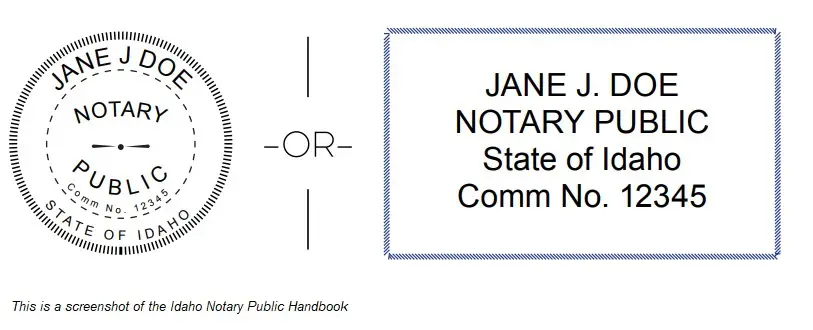
You may find a list of notary stamp vendors on the Idaho Notary Public Resources page.
Step 6: Maintain a good record of business practice with a notary journal

As a notary signing agent in Idaho, it is a good maintain a journal of all the notarial acts. Keeping a good record of your notary acts is an essential part of good business practice. It could serve as proof that you have taken reasonable steps to identify the signer of a document.
If your journal is maintained in a physical format, you should have one bounded with pre-printed pages. It must be bound with a soft cover and cannot be more than 11-inches in height and 16.5 inches in width when fully opened.
You may find it at stationery, office supply stores, or through notary associations.
Whereas for a journal in an electronic format, it needs to be a permanent, tamper-evident. Make sure that it is complying with the rules of the Secretary of State.
Each journal entry should include the date and time of the notarization; the type of notarial act, a description of the document (usually the document date and type); the type of identification used; the signature,
Quote from Idaho Notary Public Handbook
printed name, and address of the person for whom the notarial act was performed (except for certified deposition transcripts or certified copies); and the fee (if any) charged for the notarization.
Step 7: Familiarize with the Idaho notary laws and rules
Although it is not mandatory to take a training course, it is essential to equip yourself with notarial knowledge. After all, you need to know what you can or cannot do as a notary in Idaho.
Complete the Idaho Notary Public Training Course
This is one of best ways to learn about notary practice in Idaho. In fact, I personally learned a great deal from it, and it absolutely helped me in preparing for this guide.
The training course can be found on the Secretary of State website.
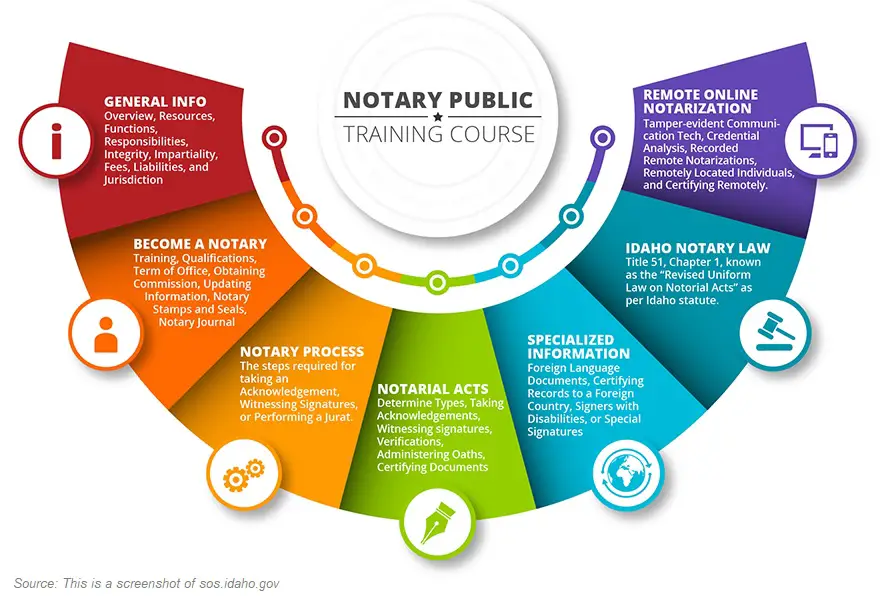
It consists of 7 videos covering the following topics:
- General info
- Become a notary
- Notary process
- Notarial acts
- Specialized information
- Idaho notary law
- Remote online notarization
After you complete each session, there are some quiz questions. Although they are optional, it indeed could help you evaluate how well you know the course materials.
I just checked out all the videos. Each clip is only between 2 to 3 minutes long, so it should take about 20 to 30 minutes to complete them all.
Study the Idaho Notary Public Handbook
The videos in the training course is an interactive way to learn about being a notary. However, if you want to go over the contents more in-depth, you should read over the Notary Public Handbook.
This is a 47 pages guide that covers most of the topics that you need to know.
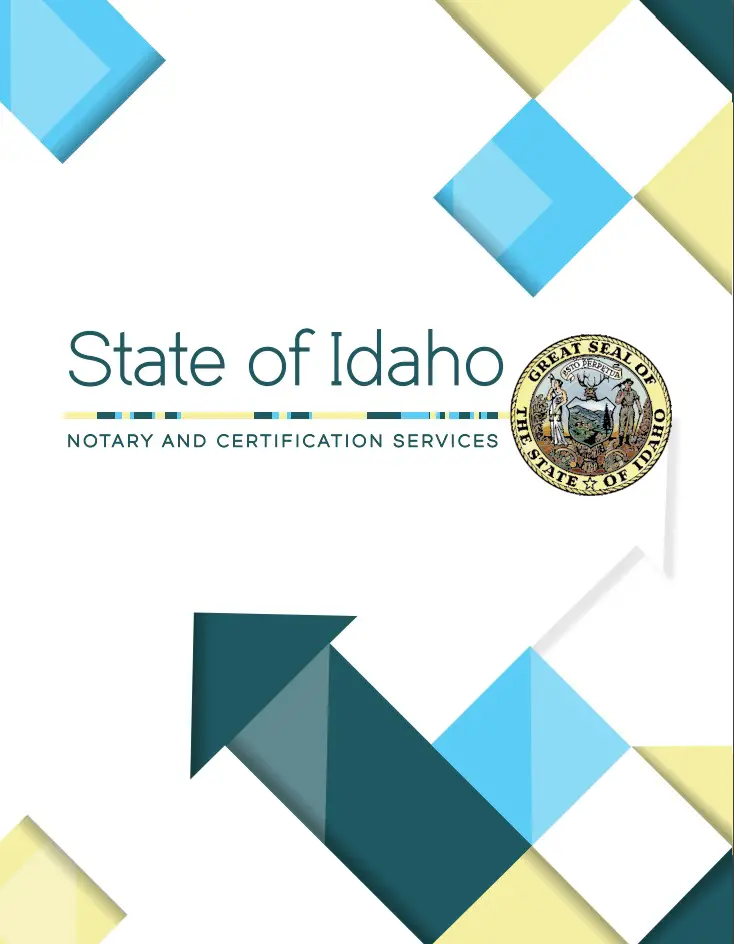
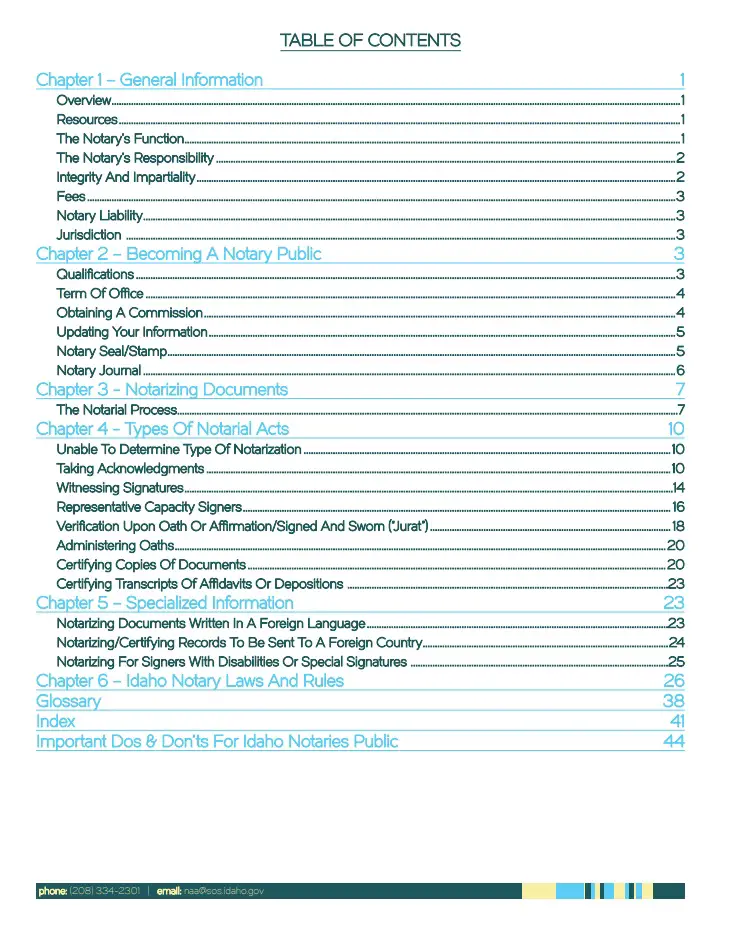
Source: The above are screenshots of the Idaho Notary Public Handbook
Jacob: “Here’s a review of the Loan Signing System training. In there, you will find out the course curriculum, costs, and student ratings from different sources. I have talked to several notary signing agents who took the course. They will share with you their first-hand thoughts about the LSS.“
Does Idaho allow remote online notarization (RON)?
Let me briefly explain the difference between “Remote Online Notarization” and “Electronic Notarization.”
Remote online notarization does not require you to be physically present with the signer. Instead, you would verify their the signer’s identity through video and audio conference.
On the other hand, electronic notarization, also known as “e-notary” is where the signings and document transmission can be done electronically. But this does not specify whether you need to be physically at the same location as the signer.
In Idaho, both Remote Online Notarization and Electronic Notarization are allowed. The option to work digitally could bring you great convenience to streamline your notary practice.
Below is a video which talks more about RON from the Notary Training Course.
How do I become a remote online notary in Idaho?
To become a remote online notary in Idaho, you need to fill out an online application on the Secretary of State website. That is the same page as you did the initial commission. There is a $20 fee.
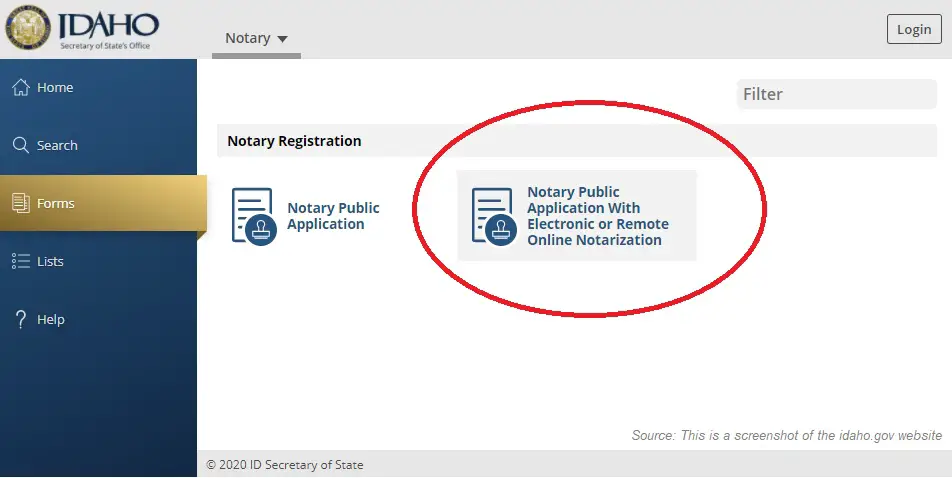
Furthermore, you must provide the name of the technology vendor which you will use to perform the electronic notarization and RON. Make sure that it complies with the regulatory rules. You may find out the National Electronic Notarization Standards here.
If you want to know how can you work from home as a notary? And the tools that you’ll need in your home office. Here’s the post for you.
How much can you make as a notary signing agent in Idaho?

The average annual income of Loan Signing Agent in Idaho is $42,360. The income typically ranges between $27,573 to $56,066. Top earning loan signing agents in Idaho are making over $83,639.
As mentioned earlier, you could work on different documents, but the loan signing in the real estate market could be a lucrative niche.
Top 10 Highest Paying Cities for Loan Signing Agents in Idaho
| City | Annual Salary |
|---|---|
| Post Falls | $48,505 |
| Pocatello | $46,630 |
| Twin Falls | $45,904 |
| Lewiston | $43,674 |
| Coeur d’Alene | $41,482 |
| Boise | $41,291 |
| Caldwell | $40,965 |
| Idaho Falls | $40,959 |
| Meridian | $40,845 |
| Nampa | $40,406 |
source: ZipRecruiter – March 11, 2022
How’s the loan signing business? Let’s hear from the Loan System Ambassador!

” I’m in Arizona, and the average fee for signings is $150 for purchases and refi’s and $125 for seller docs. With my signing service, I bring in about $30K per month.
I’m still growing my business and hope to double that by the end of the year. It’s definitely not easy to get business and takes a lot of time, effort, and hard work. I set weekly, monthly and yearly goals for myself and my business and how I want to grow it. “
– Irene Rueda, Loan Signing Agent and Arizona Loan Signing Ambassador
What’s a better way to learn about the notary loan signing business than speaking to someone who is incredibly successful in the industry?!! Here’s an exclusive interview with Irene Rueda, where she shared her journey in the loan signing business, how she got from making $800/m to $30,000/m and her thoughts about Mark Wills’s LSS training program. Be sure to check it out!
Is there demand for notary loan signing agent in Idaho?
As long as people are obtaining mortgages or refinancing their homes, there would be a demand for notary loan signing agents.
All originated mortgages in Idaho
| YEAR | RECORDS |
|---|---|
| 2017 | 54,102 |
| 2016 | 59,151 |
| 2015 | 50,554 |
| 2014 | 38,605 |
| 2013 | 53,109 |
| 2012 | 57,188 |
| 2011 | 37,943 |
| 2010 | 44,663 |
| 2009 | 56,985 |
| 2008 | 46,531 |
| 2007 | 67,396 |
Source: Consumer Financial Protection Bureau – Home Mortgage Disclosure Act (HMDA) (Aug 27, 2020)
According to the Idaho Notary Search database, there are 500 active notaries, of which 427 are eNotary, and 83 are RON. If you want to maintain a competitive edge, you definitely should consider incorporating e-notary and RON in your practice.
Some states are “Attorney States,” which means only attorneys can coordinate the closing paperwork of a real estate. Whereas, others are “Escrow States” where escrow companies would handle the mortgage closing.
According to the First American Title, Idaho is a not an “Attorney State.”
Here is a post covering the differences between escrow states and attorney states and its impact on the loan signing business. You will also find a case study where a signing agent went from barely making end needs to earning over $10,000/month even in an attorney state.
If you want to succeed in the loan signing industry, you must check out this loan system training program. If you review the testimonials of his students, you’ll be amazed at how the notary career changes their life after they learned from Mark Wills. (**)
How much does it cost to become a notary in Idaho?

It would cost approximately $212 to become a notary in Idaho.
Here’s a breakdown of the costs to start a notary signing business
| Notary Application Fee | $30 |
| Electronic Application Fee | $20 |
| Surety Bond with E&O | $130 |
| Notary Seal | $17 |
| Journal | $15 |
There could be other expenses involved, travel expenses, car maintenance, auto insurance, remote notary technology, laptop and other business supplies.
Can a felon be a notary in Idaho?

Having a conviction for a felony may impact the application to become a notary in Idaho. The Secretary of State needs to make sure that you are a person with credibility, truthfulness, and integrity to fulfill the responsibilities of the position.
Below are the questions on the notary application. If you answer “Yes” to any of them, you need to provide a written explanation and submit all associated documentation.
Have you been convicted of a felony or crime involving fraud, dishonesty, or deceit?
Have you been found in any legal proceeding or disciplinary action to have acted fraudulently, dishonestly, or deceitfully?
Have you had a notary commission denied, revoked, or restricted in any state?
Quote from State of Idaho Notary Public Application
As I’m reading the Idaho Code 51-123, it seems that they pay a close attention to felony or a crime involving dishonesty or deceit.
However, having a felony does not necessarily mean your application will automatically be declined. It depends on the severity and nature of the conviction. I believe that the Idaho Secretary of State would review it on a case-by-case basis.
How long does it take to become a notary in Idaho?
It should take a 4 weeks to become a notary in Idaho. After you submit the online application and provide all the required documents, the Office will mail you the notary certificate. Then you could purchase the notary seal and journal.
How to renew notary commission in Idaho?
In Idaho, you must renew the notary commission every six years. The renewal is similar to the procedures as you were applying for the initial commission, where you will do it through their online system. There is a renewal fee of $30.
To avoid an interrupted business period, begin the renewal process in advance. Don’t wait till your current notary commission is expired.
Can I notarize for a family member in Idaho?

You must not notarize any documents where you have any financial or beneficial interest in the transaction. Therefore, notarizing a document for any family member could call into question, and such practice should be avoided.
I have more questions about being a notary public in Idaho, where could I obtain more details?
You may contact the Idaho Secretary of State:
- Phone: (208) 334-2301
- Email: naa@sos.idaho.gov
If you are reading up to this point, I bet you must be interested in the notary signing profession. But why reinvent the wheel when there is a proven system that works? Many students had great success following the Loan Signing System (LSS) from Mark Wills. You may click here to check it out yourself. (**)
Disclaimer: The information in this post is for general information only, and not intend to provide any advice. They are subjected to change without any notice, and not guaranteed to be error-free. Some of the posts on this site may contain views and opinions from individual not related to JCHQ Publishing. They do not necessarily reflect our view or position.
(**) Affiliate Disclosure: Please note that some of the links above are affiliate links, and at no additional cost to you. Our company, JCHQ Publishing will earn a commission if you decide to make a purchase after clicking on the link. Please understand that we include them based on our experience or the research on these companies or products, and we recommend them because they are helpful and useful, not because of the small commissions we make if you decide to buy something through the links. Please do not spend any money on these products unless you feel you need them or that they will help you achieve your goals.
Reference:
- First American Title- Your Guide to Real Estate Customs by State (source)
- Idaho Secretary of State
- Idaho Legislature Code 51-123 (source)
- SuretyBonds.com – Idaho Notary Bond (source)
- Salary.com – Notary Signing Agent Salary in Idaho (source)
- ZipRecruiter – Loan Signing Agent Salary in Idaho (source)
- Consumer Financial Protection Bureau – Home Mortgage Disclosure Act (HMDA) (source)

